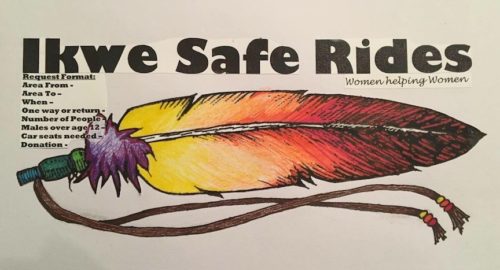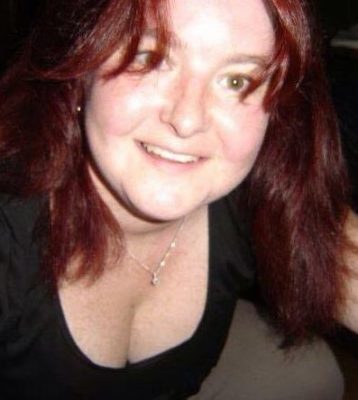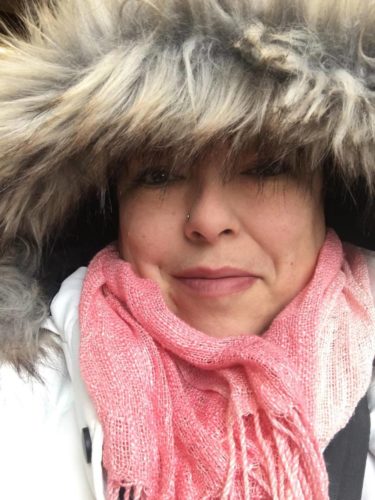WINNIPEG, Man. – A Facebook group is taking the issue of women’s safety and transportation to a new level. Ikwe Safe Rides (Women Helping Women) is a private, members-only Facebook group based in Winnipeg, Canada. It has a mandate to offer its membership a safe, donation-based alternative to using taxis.
The group is managed by six administrators and has more than 14, 600 members participating. Two of the administrators are Dana Williams, a self described tree-hugging Witch, and Christine Brouzes, a Metis woman who follows a Christian spirituality. Both Williams and Brouzes devote their free time and energy to administering the group, and to driving other women in need of safe transportation around the city.

Winnipeg is a sprawling city of more than 700,000 people. Despite the population and geographic size, it lacks an efficient mass transportation service. The primary options available to citizens are private cars, taxis, and a bus system, which does not adequately serve all areas of the city. Further complicating things is a long and frigid winter, with a great amount of snow. Moving freely throughout the city is challenging, with long distances between amenities such as grocery stores, schools, medical facilities, and shopping destinations.
Many residents find they need to use a taxi service in order to haul groceries or attend to personal business. For women and children, particularly Indigenous women and girls, taking a taxi ride with one of the commercial companies in town can be a risky and frightening experience. It has become a regular occurrence that the local media will report an incident of sexual violence or harassment by taxi drivers against these groups, and other marginalized people.
The problem has become so intense that the Southern Chief’s Organization (SCO), a First Nations group representing thirty-two First Nations communities in southern Manitoba, issued a November press release, calling attention to the safety concerns and problems experienced by marginalized groups using taxi services. SCO has also created a Taxicab Community Complaint Advocate position in order to assist victims in navigating the system.
Reports of sexual assaults by taxi drivers are common. In May 2016, a transgender man was attacked, and then offered money by the taxi driver to drop the charges. The driver is now charged with sexual assault and obstructing justice. In August 2016, a 37-year old driver was charged with sexually assaulting a 17-year old girl. In December, it was reported that a 19-year old university student was drugged by a taxi driver, sexually assaulted, and woke up the next morning in bed with a man she did not know.

Ikwe Administrator Dana Williams (courtesy photo)
It is reported cases like these and the many other anecdotal stories from community members that led to the founding of the Ikwe Safe Rides (Women Helping Women) Facebook group January 31, 2016. In the Ojibwe language, Ikwe means “woman”, and this group is open to all who identify as women. Men may accompany women on trips, but membership is reserved for self-identified women only.
For Williams,who also co-facilitates the Winnipeg Pagan Pub Moot, serving her community through Ikwe is just part of being a conscientious human being: “I don’t want to live in a city where people don’t help each other, this is the right thing to do.”
As a mother of two, grandmother, and full-time worker at an animal shelter, Williams does not have a great deal of free time, and as she speaks to The Wild Hunt, she regularly checks her phone, monitoring requests for rides coming through the Ikwe Facebook group.
“We work really well together without having many rules” says Brouzes, stressing that Ikwe is not a business, but a private, volunteer based, donation sponsored alternative to taxi services.
“We are not a free ride service, donations are encouraged. Elders can ride for free.” With a chuckle, Williams adds: “Alot of our members aren’t willing to ride for free” and she went on to explain that donations are often greater than what a taxi fare would have been, as members are so grateful to have a safe and cheerful ride with an Ikwe driver.
“What I enjoy most about giving rides to people is sometimes exposing women, who because of the fear, have a limited access to this world.’ says Brouzes, sharing a story about a young inner city mother, who wanted to pick up a television she was purchasing through Kijiji. It was to be collected from a far-flung suburb, in a part of the city that the young woman had never seen before.
“She had the money for the TV, and needed safe transport. She felt safe with Ikwe Safe Rides and a woman driver, to do that.”
The Ikwe team is planning to expand the group next summer, and will have a larger vehicle to use in order to provide rides for women and their families who would like to participate in recreational and cultural activities outside the city. Brouzes explains: “Birds Hill (Provincial Park) is close enough to do a few runs back and forth a day.”
In addition to this, members will be able to access a family-friendly powwow and day trips to the beach.

Ikwe Administrator Christine Brouzes [Courtesy Photo]
Drivers for the group are screened to ensure that they have a valid drivers license, and up-to-date vehicle insurance. Appropriate car seats are available for the children of the members taking rides.
Members are asked to post to the group when they need a lift, stating the area of town they are leaving from and traveling to. A driver will then respond to the post, requesting a private message with details from the member. When the request is booked, the driver will post “booked” to the wall post, and “completed” when the trip is done. Members and drivers can work out if a return trip is needed, or another trip on a different day.
Ikwe is not the only safe ride service in Winnipeg, but it is the largest. The demand for safe and affordable transportation is increasing as people learn about this particular alternative. Brouzes explains: “Of the 15,000 or so rides we have provided to women, and the several hundred that I have personally provided, every single woman, when I ask them, have you ever had an Ikwe ride before? Whether they say yes or no, they follow up that statement with ‘I’m so glad you exist because…’ and all of them have a negative story to tell about taking a taxi in Winnipeg.”
This grassroots approach to solving the transportation gap in Winnipeg has been successful so far, thanks to the hard work of many community-minded members. The model is being honed and expanded as the group develops and gains capacity. Other community-based approaches to transportation in Winnipeg includes Peg City Car Co-Op, a carsharing program, other safe ride programs. Additionally, Uber is expected to expand into the city once hurdles with the Taxicab Board and public insurance are solved.
The Wild Hunt is not responsible for links to external content.
To join a conversation on this post:
Visit our The Wild Hunt subreddit! Point your favorite browser to https://www.reddit.com/r/The_Wild_Hunt_News/, then click “JOIN”. Make sure to click the bell, too, to be notified of new articles posted to our subreddit.
Sisters, doing it for ourselves!!! ::D
Sad that such a thing is necessary, but glad to see women looking out for one another!